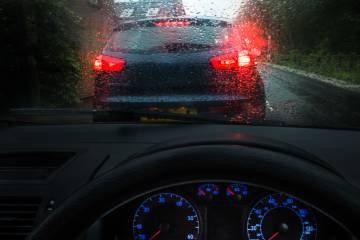Car-insurance fronting is when someone who should be the main driver, pretends to be a named driver.
It’s done because older, more experienced drivers often pay lower costs than younger, less experienced motorists.
Although it might seem like a harmless way to keep costs down, fronting is a form of fraud and is illegal – and it can result in a criminal record.

What is fronting?
Fronting where an older, more experienced driver puts themselves as the main driver of a car insurance policy to fraudulently reduce their costs. In fact, the main driver is a younger, more experienced driver who'd normally have to pay a much higher price.
Some examples of fronting include:
- A new driver is added as a named driver to their parents' car insurance policy. The parents rarely drive the car and it belongs entirely to their child.
- A university student is a named driver on their parents' policy, rather than taking out a student car insurance policy. The car is exclusively driven by the student to and from campus, and the parents never even see the car.
Is fronting car insurance fraud?
Yes, fronting is illegal and it’s a form of car insurance fraud. To be clear, any way that you might lie to get cheaper car insurance could land you in trouble.
If someone is caught and prosecuted with fraud they could end up with a criminal record.
It could also be hard to get insurance in the future if you’re caught out, or it might be a lot more expensive. And even if you don’t set out to deliberately lie, you can still be in trouble if you end up fronting without meaning to.
For example, a parent might have been truthful when the policy was bought. But if halfway through the year they change jobs and barely use the car as a result. It might end up with a situation where the car is usually driven by a younger, named driver.
This would constitute fronting.
Why does car insurance fronting happen?
Fronting happens as a way of trying to cut costs. This is because the average cost of a car insurance policy is £995 according to our car insurance price index*.
But the average cost of car insurance for a 17-year-old driver is substantially more. The cost of car insurance falls as you get older, and younger drivers pay the highest costs.
Some parents or grandparents might try to lower that cost by putting themselves as the main driver, and listing their child as a named driver.
Fronting could also happen by accident, if someone hasn’t kept their details up to date on an insurance policy.
What’s the punishment for car insurance fronting?
If you're caught fronting:
- Your insurance company might void or cancel your policy.
- Any claims you made could be voided
- You could face a criminal prosecution for car insurance fraud
- You risk getting a criminal record
How do insurance companies prove car insurance fronting?
Insurance companies use a range of techniques and motor insurance databases for detecting this kind of fraud when you buy a policy and begin driving.
If they don’t find out at the time of purchase, it usually comes up when making a claim.
What type of drivers can I select when getting a quote?
When you get a car insurance quote, you're asked about:
- Who the owner is
- Who the registered keeper is
- Who the main driver is
- Who the named drivers are (if any)
Who is the owner?
The owner is usually either:
- The person who paid for the car
- If the car was a gift, it's the person who it was given to
- If the car is leased or bought through hire purchase, the owner is the finance company
Who is the registered keeper?
This is the person who’s responsible for getting the car its tax, MOT and insurance cover.
The registered keeper is also the person who gets sent parking fines and speeding tickets – it’s the registered keeper whose name is on the car's V5 logbook.
Who is the main driver?
This is the person who drives the most miles, drives the most often, uses the car to commute to work and keeps the car outside their home.
This is usually the same person as the registered keeper, but not always.
What is a named driver?
This is the person who drivers the vehicle occasionally.
For example, someone's partner may be a named driver on their car.
Can I be the main driver on 2 cars?
You can be the main driver on 2 cars, but only if you’re actually the main driver. If not, and someone else is, this is fronting.
If you have driving other cars (DOC) on your car insurance policy, this could let you drive another car with third-party cover. But, if you're the main driver of this other car, you should have a separate policy for it.







